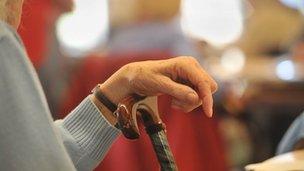Adult social care suffering under cuts, survey suggests
- Published

Less time with clients and heavier workloads were reported by many social workers in the survey
Care for vulnerable older people has been suffering - both in quality and quantity - because of funding cuts, a survey of 200 social workers suggests.
In the survey by Age UK and the College of Social Work, more than 85% of respondents said they had seen the impact of cuts in the past year.
Of those, 95% said the cuts in England presented "a risk to the dignity of their older clients".
The Department for Health says the care of older people is a priority.
Councils across the country have been facing a funding squeeze under the coalition's spending cuts.
Since 2004, social care funding has stagnated, and then decreased, Age UK said. This is despite an increase of more than 250,000 people aged 85 or over, the group most likely to require social care.
The charity said the funding given this year was half a billion pounds less than when the coalition came to power in 2010.
'Growing workload'
As well as concerns about the dignity of older clients, some 70% of respondents to the survey "expressed a lack of confidence that local authority-funded older clients always received the right quantity and quality of social care".
Other effects of the cuts reported in the survey include:
65% of the social workers reporting a rise in emergency re-admissions among older clients over the past year
a rise in charges for day care centres, home care and community transport, according to 70% of the social workers
less face-to-face time with clients, according to 65% of respondents
an increase in workload, say 89% of the social workers surveyed
Age UK charity director general Michelle Mitchell said: "This survey sheds an important light on the scale of current underfunding and shows that cuts to front-line services are having a severe impact on those older people struggling to live with chronic illness and disability.
"Age UK calls on the government to recognise and close the current funding gap, and to build on the programme of legislative reform set out by the White Paper by establishing a fair and sustainable system of social care funding."
Richard Barker, from the College of Social Work, said the failure to properly invest in care was storing up problems for the future.
"We've got a reduction in cash for services alongside an increasing demand. If we spend on social work services now for older people, we'll make sure that we can deal with things at a level where crises do not develop, which would then be more expensive," he said.
The Department for Health says the care of older and disabled people is a priority and it is investing £7.2bn over four years to enable local authorities to protect access to care and support.
It believes councils can maintain necessary levels of help if they reform services and drive down costs.
- Published1 December 2012
- Published26 October 2012
- Published12 October 2012
- Published23 August 2012